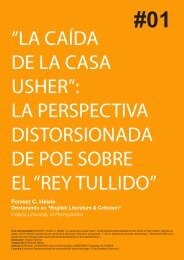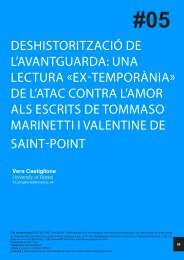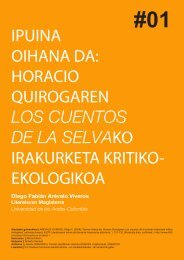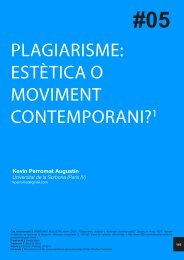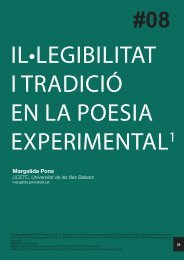a nation of ghosts?: haunting, historical memory and ... - 452ºF
a nation of ghosts?: haunting, historical memory and ... - 452ºF
a nation of ghosts?: haunting, historical memory and ... - 452ºF
You also want an ePaper? Increase the reach of your titles
YUMPU automatically turns print PDFs into web optimized ePapers that Google loves.
against the grain <strong>of</strong> the original literary work. This is the case <strong>of</strong> well<br />
known film adaptations such as Tiempo de silencio, !Ay, Carmela!, or<br />
O lápis do carpinteiro, three very recognizable works dealing with the<br />
traumas <strong>of</strong> the past in Spain, from the postwar, the transition, <strong>and</strong> the<br />
globalization period respectively. Recent popularly acclaimed films<br />
dealing with this topic such as Los girasoles ciegos, Las trece rosas,<br />
Silencio roto, Libertarias, or El viaje de Carol, all have the same look<br />
<strong>and</strong> feel <strong>of</strong> conventional heritage drama productions. Some critics<br />
have pointed out that these works, in spite <strong>of</strong> their noble goals <strong>of</strong><br />
making the traumatic past <strong>of</strong> repression <strong>and</strong> resistance accessible<br />
<strong>and</strong> underst<strong>and</strong>able to contemporary Spanish audiences, mostly<br />
without direct access or personal recollection <strong>of</strong> those events,<br />
they have made it perhaps too palatable <strong>and</strong> too comfortable, thus<br />
neutralizing their potential as instruments for social intervention.<br />
These film <strong>and</strong> TV series, dressed in the polished style <strong>of</strong> costume<br />
dramas, can appear to reinforce the idea <strong>of</strong> the pastness <strong>of</strong> the<br />
past, easily accessible but just as easily disconnected from present<br />
day <strong>historical</strong> realities <strong>and</strong> social <strong>and</strong> political concerns 6 . This trend<br />
may suggest a certain aesthetic commoditization <strong>of</strong> the horrors <strong>of</strong><br />
the past, somewhat domesticated for contemporary consumption,<br />
when not a nostalgic reinterpretation <strong>of</strong> the past, such as Fern<strong>and</strong>o<br />
Trueba’s Academy-winner Belle Epoque. In some extreme cases,<br />
these representations are literally costume melodramas featuring<br />
glamorous TV actors <strong>and</strong> actresses, appealing to a retro aesthetic,<br />
with fancy period dresses <strong>and</strong> décor, as in the popular Spanish<br />
television soap opera Amar en tiempos revueltos, which has been a<br />
leader in television audience rankings in Spain for several seasons.<br />
As the title <strong>of</strong> the series already suggests, the postwar dictatorship<br />
is just a mere melodramatic backdrop for the conventional love<br />
intrigues <strong>and</strong> disputes characteristic <strong>of</strong> the telenovela genre.<br />
The unproblematic transparent mimetic representation <strong>of</strong> the past, with<br />
its meticulously reconstructed mise-en-scene, <strong>and</strong> traditional linear<br />
structure, effectively sutures the discontinuities <strong>of</strong> the fragmented<br />
past, made out <strong>of</strong> silences <strong>and</strong> voids. This tendency to reconstruct<br />
the past as a narrative without fissures <strong>and</strong> safely removed from<br />
present day realities, thus paradoxically seems to replicate the<br />
straight <strong>and</strong> smooth <strong>of</strong>ficial <strong>historical</strong> narratives that avoid challenging<br />
the status quo. Thus, many <strong>of</strong> these sanitized representations <strong>of</strong><br />
the past dangerously follow the <strong>of</strong>ficially sanctioned discourse <strong>of</strong><br />
reconciliation without apologies or reparations, <strong>and</strong> the erasure <strong>of</strong><br />
potentially destabilizing counter-discourses, reinforcing the pastness<br />
<strong>of</strong> the past <strong>and</strong> its irrelevance to present day concerns.<br />
On the other h<strong>and</strong>, some writers <strong>and</strong> directors dealing with the<br />
subject <strong>of</strong> the Spanish civil war <strong>and</strong> the dictatorship have recurred to<br />
other non-realistic modes, in an effort to better capture the work <strong>of</strong><br />
<strong>memory</strong>, the experiences <strong>of</strong> trauma, the silences <strong>and</strong> the voids <strong>of</strong> the<br />
NOTES<br />
6 | Several cultural critics <strong>and</strong><br />
intellectuals have noted the<br />
problematic ramification <strong>of</strong> this<br />
trend (Labanyi, Rosa).<br />
A Nation <strong>of</strong> Ghosts?: Haunting, Historical Memory <strong>and</strong> Forgetting in Post-Franco Spain - José Colmeiro<br />
<strong>452ºF</strong>. #04 (2011) 17-34.<br />
29




